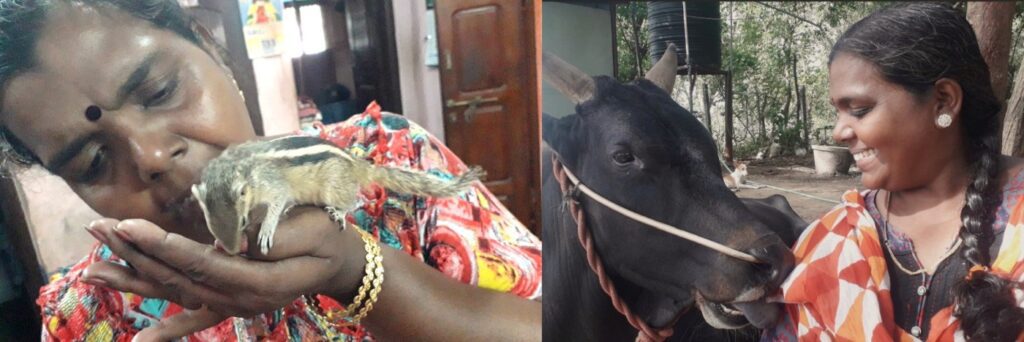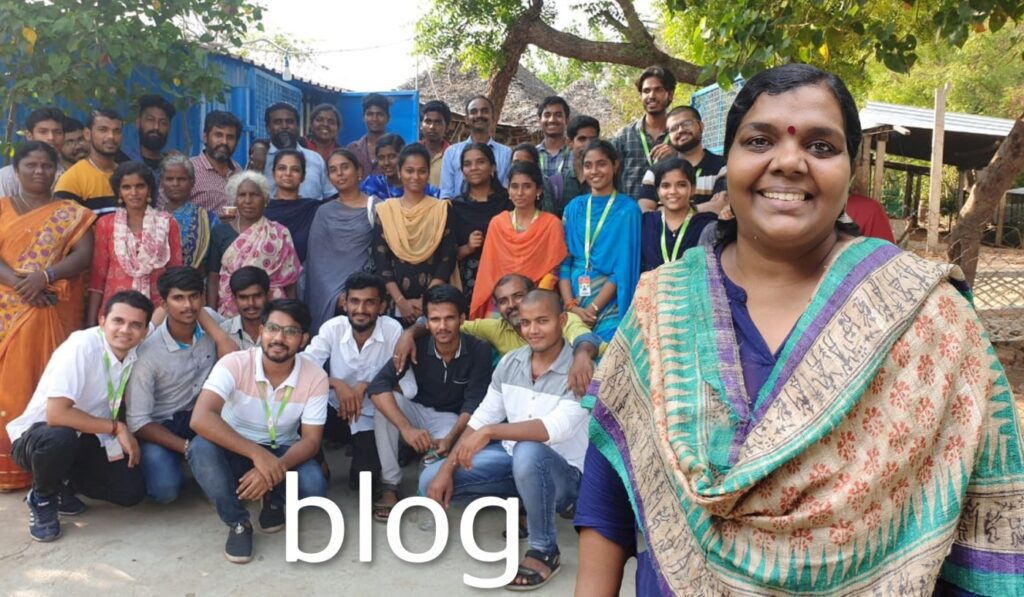Following their shared passion for nature, Maria Juliet (MJ) and her husband transitioned from corporate life to traditional organic farming and animal rescue. Health issues led MJ to realize the importance of reconnecting with nature, prompting her and her husband to pursue sustainable living.
Drastic reduction in surrounding native flora & fauna, destruction of their habitats, and pollution of natural resources in parts of Tiruchirapalli District, Tamil Nadu are apparent indications of the weakening co-existence mindset among people and negligence towards preserving nature for the future. If left unattended, this would lead to loss of biodiversity at an alarming rate! Read further to know more about the change that has happened to date and what is needed to move forward.
By Maria Juliet
Introduction: A Passion for Nature
Right from my childhood, though I grew up in an urban area, I always stayed connected with plants & animals. I admired chirping sparrows building small nests inside our house roof; squirrels that ran up and down the neem, mango, banana and drumstick trees in our backyard nibbling the flowers, taking bites of the tasty fruits. Native garden lizards climbed up and down the green fences preying on mosquitoes, dragon flies and grasshoppers. But, since a few years, I rarely see a garden lizard, I did not spot sparrows and the squirrels are fewer; trees are cut by people for trivial reasons such as ‘dry leaves falling on the ground’.
I felt sad to see situations where instead of the mother squirrels, animal activists and environmentalists rescue and nurture many orphaned newborn squirrel pups that fell out of chopped trees.
From Urban Upbringing to Rural Roots
My life partner is from a rural town in Trichy district, Tamil Nadu. He has an agricultural background and a deep passion for ecology. Working as Biotechnologists, we resided for a few years in Bangalore, named the Garden City for its greenery & favorable weather conditions. But, as the city developed, we found surrounding birds and animals, due to extensive construction, over-speeding vehicles and non-eco-friendly modern lifestyles were struggling to survive.
The Struggle for Biodiversity in Tiruchirapalli
A few years later, we shifted to rural life in my husbands’ native place. We were very enthusiastic to move closer to nature with the expectation of witnessing humans co-existing with surrounding native trees, animals and birds. However, we were astonished to see that the place was losing its biodiversity; the surrounding flora and fauna struggling for their basic needs and this problem only increased over the years. Residents spent time swimming and play in the nearby river and water channels where turtles, fishes, snails and several aquatic species survived. But, today the water bodies are polluted with dumped plastics bags, diapers & bottles. The poor turtles which migrate to residential places for survival are considered as menace and killed.
Corporate Life vs. Nature: A Turning Point
One rainy morning, while at home, children from the neighborhood called my husband to immediately attend an emergency. They took us to a nearby small tributary which once upon a time was clean and clear. We found a very long and large fishing nylon net irresponsibly left in the river. Many snakes, turtles, crabs and frogs crossing the channel got entangled in the net, choked, injured and few were bleeding to death. And this during the breeding season. All human passers-by expressed their sympathy, but no-one helped. Some local children, however, assisted us to pull the heavy net to the land where we carefully cut the nylon strings, one by one. With their help we could save a few lives.
On the banks of these tributaries, back in the days, fruit & flowering trees provided shelter for cuckoos, native pigeons, parrots, owls, myenas, crows, slender loris, and other birds. Today, many of those trees have been cut and I wonder what happened to their inmates.

Witnessing the Decline: A Heartbreaking Reality
Five years earlier, we initiated a clean-up drive of a water channel & pond; we spent a full month to complete the task with the support of local environmentalists but due to lack of awareness of people who reside on the banks of those tributaries, the channel now again was polluted. Heavy plastic usage is one of the root causes. In this initiative, our approach failed.
Even farmers need awareness training about eco-friendly agricultural practices. To earn sufficient money, they want higher yields of paddy, so they chose to use chemical-based farming methods right from seed germination till post-harvest processing. The chemical fertilizers, weedicides and pesticides used form a big threat to human health, the environment & ecosystems; and this will have devastating consequences for future generations.
The Lost Wisdom of Traditional Farming
Traditional knowledge reveals that more than 1 lakh indigenous native varieties of paddy were cultivated in the southern parts of India each having its distinct features and health benefits; now the number is reduced to a few commercial varieties only. Years ago, I have observed children climbing trees, chasing butterflies, building small mud-houses, playing in the playground, in the rain, taking a bite of native jamun fruits & tamarinds falling from trees, swimming in the nearby ponds, swinging clinging on to branches of banyan trees, riding bicycles. They never had costly toys but nobody heard them saying “I am feeling bored”. In recent years, I observed that children have a variety of toys, toy shops on every corner, a wide variety of snacks, television to watch cartoons, computers & video games yet during holidays they feel bored. What is it that they are missing?
Children and Nature: A Lost Connection
Moreover, parents do not want their children to play outside in the mud because they know the soil & water is polluted. A senior resident who has lived in Lalgudi Taluk for many years remembers the beauty of this diversified land, the fertile soil, natural water resources, chemical-free agriculture and co-existence of people with surrounding flora & fauna. He shared his memories of drinking clean & clear water and playing football on the clean ground of those water channels which dried up during summer. He added, in those days, animals and birds had other choices for clean drinking water and all the water bodies were unpolluted. He agrees that the current environmental condition is threatening, and the residents have major influence over this challenging situation.
The Birth of MEAHLVANAM TRUST
It is therefore that me and my husband started the MEAHLVANAM TRUST (Voice of Nature) and we are dedicated to restoring biodiversity, promoting co-existence with flora and fauna, and fostering sustainable living practices. We want to reduce the carbon footprint by raising awareness and providing training sessions to children, families, and communities. We use methods such as waste segregation, reduction of single-use plastics, carbon footprint reduction techniques, organic gardening, and community kitchen setups. All this with the goal of creating a model for sustainable living.
Do you, like MJ, carry a plan to start your own organisation to address an environmental and/or social issue? Then the kanthari impact leadership training program could be the right place for you.
Learn more about the course and apply to become a participant in the 2025 program that starts in April: https://www.kanthari.org/admissions/



